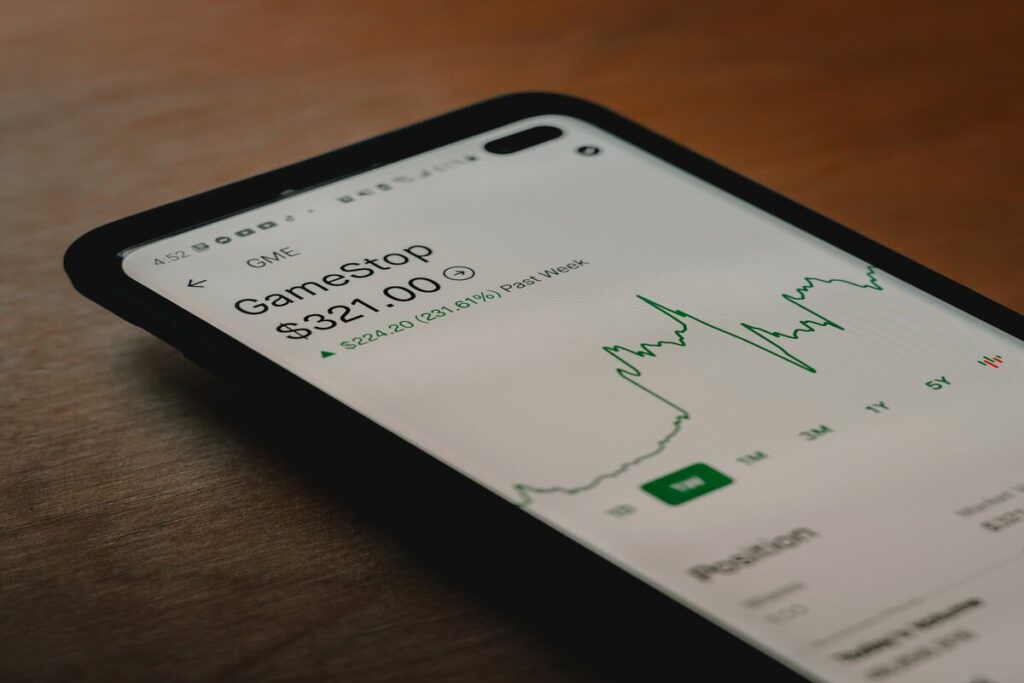
The Impact of Inflation on Abu Dhabi’s Investment Market

In today’s dynamic economic environment, one word has a profound effect on investment decisions: inflation.
In this blog, we examine the prices of an increase on many fronts and its profound impact on the complex nature of financial markets. This information will be crucial for intelligent investors to understand inflation, as the passing of time sees the currency slowly devalue.
How does inflation affect financial markets?

At its core, inflation represents the steady rise in the general price level of goods and services within an economy. It is a subtle yet potent force, exerting its influence on every facet of financial transactions. From the cost of daily essentials to the valuation of sprawling investment portfolios, the impact of inflation is pervasive, often hiding in plain sight.
Inflation’s role as a financial bedrock cannot be overstated. Central banks and economists closely monitor inflation rates, seeking to strike a delicate balance between stability and growth. For investors, understanding the ebb and flow of inflation is akin to navigating the tides of a vast ocean – a skill that can mean the difference between sinking and sailing toward prosperity.
What do you mean by inflation?
Inflation, the subtle force that shapes economies, is a phenomenon as intriguing as it is impactful. It’s a term tossed around financial circles, but what exactly does it entail?
This section aims to demystify inflation, delving into its definition, the underlying causes, and its historical footprint in Abu Dhabi. Furthermore, we will embark on a comparative analysis of inflation rates, shedding light on how this economic force has evolved in the region.
What is really causing inflation?
At its core, inflation refers to the persistent increase in the general price level of goods and services over a defined period of time. It’s a phenomenon that can subtly erode purchasing power, influencing everything from daily expenses to long-term investments.
There are various causes that can trigger inflation, ranging from increased demand for goods and services to supply chain disruptions or even government policies. Understanding these causes is essential for policymakers and investors alike, as they shape the economic landscape and influence financial decisions.
- Increased Demand for Goods and Services
One of the primary drivers of inflation stems from an upsurge in the demand for goods and services within an economy. This surge can be fueled by various factors, such as increased consumer spending, business investment, or even government expenditure.
When demand outpaces the economy’s capacity to produce goods and services, prices naturally begin to rise. This dynamic, known as demand-pull inflation, can lead to a sustained increase in the overall price level.
- Supply Chain Disruptions
In today’s interconnected global economy, supply chain disruptions can exert significant pressure on prices. Events like natural disasters, geopolitical conflicts, or even logistical challenges can disrupt the flow of raw materials and finished products.
This scarcity, combined with sustained demand, can lead to a situation known as cost-push inflation. Manufacturers and service providers pass on the increased production costs to consumers, resulting in higher prices for end products.
- Government Policies and Monetary Factors
Government policies play a crucial role in influencing inflation.
For instance, when a government increases its spending or lowers taxes, it injects more money into the economy, potentially leading to an increase in demand. Moreover, central banks’ monetary policies, such as lowering interest rates or increasing the money supply, can also impact inflation. These measures alter the cost of borrowing and influence consumer spending and business investment.
- Exchange Rate Fluctuations
Inflation can also be influenced by changes in exchange rates. A depreciation of a country’s currency relative to others can lead to an increase in the prices of imported goods and services. This phenomenon, known as import inflation, can contribute to an overall rise in the general price level within an economy.
- Wage-Price Spirals
A wage-price spiral is a self-reinforcing cycle where higher wages lead to higher prices, which in turn lead to demands for even higher wages. This can be initiated by various factors, including strong labor unions, labor shortages, or cost-of-living adjustments.
When not managed effectively, this spiral can lead to persistent inflationary pressures.These causes of inflation, though diverse in nature, collectively underscore the complex interplay of economic forces that contribute to changes in price levels.
How Does Inflation Affect Investments?
Why is understanding the impact of inflation on investment so important? The answer is to preserve and grow wealth.
As inflation exerts its subtle pressure, the purchasing power of the currency decreases. This means that a dollar today may not stretch that far tomorrow. Investors eager to protect the value of their assets need to master strategies to beat creeping inflation.
Is Abu Dhabi good for investment?
Nowhere is the dance between inflation and investment more pronounced than in the thriving market of Abu Dhabi. This vibrant emirate stands as a testament to the dynamic nature of the global economy, drawing investors from all corners of the globe. With its strategic location, robust infrastructure, and forward-thinking policies, Abu Dhabi offers a fertile ground for ventures of all scales.
Inflation in Abu Dhabi
Abu Dhabi, with its rich economic tapestry, has witnessed the ebbs and flows of inflation over the years. Understanding this historical context provides invaluable insights into how economic policies and global events have shaped the emirate’s financial landscape.
From the early days of rapid development to periods of global economic shifts, Abu Dhabi’s experience with inflation is a narrative of adaptation and resilience. As per statistics, the UAE inflation rate for:
- 2022 was 4.83%, a 4.84% increase from 2021.
- 2021 was -0.01%, a 2.07% increase from 2020.
- 2020 was -2.08%, a 0.15% decline from 2019.
- 2019 was -1.93%, a 5% decline from 2018.
To truly grasp the impact of inflation on investments in Abu Dhabi, it’s essential to consider its relative standing within the broader region.
Comparing inflation rates across neighboring emirates and countries offers a comprehensive perspective on Abu Dhabi’s economic stability. It allows investors to gauge the relative strength and resilience of the local market in the face of inflationary pressures.
What are inflation risks in investing?
Inflation, often referred to as the silent eroder of wealth, exerts a pervasive influence on the world of investments. It’s a phenomenon that subtly gnaws at the value of money over time, leading to a reduction in purchasing power. In Abu Dhabi’s dynamic investment market, understanding the multifaceted effects of inflation is not only prudent but essential for any savvy investor.
What is the deterioration of purchasing power?
One of the most palpable effects of inflation is the erosion of purchasing power. Simply put, as prices of goods and services rise over time, the same amount of money buys fewer goods or services. This insidious process can significantly diminish the real value of savings and investments. Imagine a scenario where an individual has set aside a certain sum for retirement, expecting it to provide a comfortable lifestyle in the future. However, with the relentless march of inflation, the purchasing power of that sum gradually diminishes, potentially leaving them with less than anticipated.
To put this into perspective, consider essentials like housing, healthcare, and education. These are expenses that tend to outpace the average inflation rate, causing individuals to allocate a larger portion of their income to cover them. For investors, this means that without proactive measures to counteract the erosion of purchasing power, their portfolios may not yield the returns needed to maintain their desired standard of living.
Impact on Asset Values and Capital Appreciation
Inflation exerts a profound influence on the value of assets, ranging from real estate properties to stocks and bonds. When prices across the economy rise, the nominal value of assets tends to increase as well. However, this nominal appreciation can be deceiving. In reality, it may not signify a true increase in the asset’s worth, but rather a reflection of the diminished value of the currency.
How does inflation affect asset value?
For instance, in a high-inflation environment, real estate prices may soar, giving the impression of a thriving market.
Yet, when adjusted for inflation, the actual increase in value may be more modest. This phenomenon challenges investors to discern between nominal and real gains, emphasizing the need for strategies that account for the erosive effects of inflation.
How does inflation affect investment returns?
Inflation exerts a direct influence on investment returns by eroding the purchasing power of the returns generated. This impact is particularly evident in fixed-income investments like bonds. When an investor holds a bond, they expect to receive periodic interest payments.
However, as inflation rises, the future value of these interest payments diminishes. In other words, the purchasing power of the money received decreases over time. This can lead to a situation where the real, inflation-adjusted return on the investment is lower than anticipated.
Similarly, inflation affects the returns on dividend-paying stocks. While these stocks provide a stream of income through dividends, the real value of these payments can be eroded by inflation. Even though nominal returns may seem satisfactory, the actual purchasing power of these returns may be significantly reduced.
How does inflation affect profitability?
Inflation exerts pressure on businesses through increased costs. This includes rising prices of raw materials, labor, and other essential inputs. When costs rise, businesses may find it challenging to maintain their profit margins.
In some cases, they may need to increase prices, but this is not always feasible, especially in competitive markets. As a result, inflation can directly impact the overall profitability of investments in the stock market.
Inflation can also lead to uncertainty in the business environment. Fluctuating prices and costs can make it more difficult for businesses to plan and allocate resources effectively. This uncertainty can further impact profitability by making it harder for businesses to make strategic decisions and investments.
How can I protect my investments from inflation?

Abu Dhabi’s investment market, while offering substantial opportunities, is not immune to the impact of rising prices. To navigate this challenge, investors must deploy a strategic arsenal designed to mitigate inflationary risks. Here, we delve into four key strategies employed by our seasoned professionals and financial experts.
Diversification of Investment Portfolio

Diversification stands as the cornerstone of a robust investment strategy. By spreading investments across a variety of assets, investors can reduce the concentration risk associated with any single investment. Like the famous saying goes: “Dont put all your eggs in one basket”.
In Abu Dhabi’s market, this approach takes on added significance, as it provides a buffer against sector-specific fluctuations. A well-diversified portfolio may include a mix of equities, fixed-income securities, real estate holdings, and alternative investments. This balanced allocation helps maintain stability and potential for growth, even in the face of inflationary pressures.
Utilizing Inflation-Protected Securities
Inflation-protected securities (IPS) serve as a strategic financial instrument designed explicitly to combat the erosive effects of inflation. These securities, issued by governments, provide investors with a safeguarded return that adjusts with inflation.
In Abu Dhabi’s context, considering the potential impact of rising prices, allocating a portion of one’s investment portfolio to IPS can be a prudent move. By doing so, investors ensure that their purchasing power remains intact, even as the broader economy experiences inflation-driven fluctuations.
Real Assets as a Hedge Against Inflation

Investing in tangible assets, such as real estate and commodities, offers a direct hedge against inflation. Unlike financial assets, the value of real assets tends to rise with inflation.
In Abu Dhabi, where the real estate market has demonstrated resilience and consistent growth, considering property investments can be an effective strategy. Commodities like precious metals or agricultural products can be explored as inflation-resistant avenues to preserve and potentially enhance the value of investments.
Tactical Use of Derivatives and Financial Instruments
Derivatives and financial instruments provide sophisticated tools for investors to manage risk and capitalize on market opportunities. In the context of Abu Dhabi’s investment market, employing derivatives strategically can be a valuable component of an overall risk management strategy.
Options, futures, and other derivative instruments can be used to hedge against potential losses stemming from inflation-induced market volatility. However, it’s imperative to approach these instruments with a thorough understanding and a well-defined strategy, as they can amplify both gains and losses.
By adopting a combination of these strategies, investors can fortify their portfolios against the erosive effects of inflation. Each approach complements the others, offering a comprehensive toolkit for navigating the intricacies of Abu Dhabi’s investment landscape.
Explore Trust Accounts Management’s Comprehensive Services
In this landscape, the expertise of a trusted financial partner becomes invaluable. Trust Accounts Management, as a full-service accounting firm, stands at the vanguard of navigating Abu Dhabi’s investment terrain. Our services encompass a spectrum of offerings, from CFO services to Standard Operating Procedure implementation, all designed to fortify your financial position in the face of inflationary pressures.
Proactive Investment Strategies
Inflation’s eroding effect on purchasing power means that the value of money diminishes over time. This makes it imperative to adopt strategies that not only keep pace with, but outpace inflation.It’s about mtrustore than just preserving wealth—it’s about watching it flourish in spite of economic headwinds. As you embark on your investment journey in Abu Dhabi, consider Trust Accounts Management as your steadfast companion. Our commitment to excellence, proven track record, and comprehensive suite of services make us the ideal partner in realizing your financial aspirations. Together, we’ll not only weather the storms of inflation, but emerge stronger and more prosperous on the other side. Don’t merely invest—invest with foresight. Choose Trust Accounts Management for a future of financial success in Abu Dhabi’s vibrant investment market.

